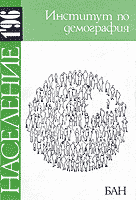Жените и мъжете в прехода към пазарна икономика
Women and Men in the Transition to a Market Economy
Author(s): Kremena Borisova-Marinova, Penka Naidenova, Galina Rizova, Marta Sugareva, Nikolay GolemanovSubject(s): Gender Studies
Published by: Институт за изследване на населението и човека - Българска академия на науките
Summary/Abstract: This article gives an analysis based on data received from the survey "Women and men in the transition to a market economy", carried out in the project BI/91/PO1 "Integrated Statistics on Women" jointly executed by the National Statistical Institute and the Instiute of Demography at the Bulgarian Academy of Sciences with the technical and financial assistance of the United Nations. The survey comprises 8626 persons aged 16-25 years, 52.1 % women and 47.9 % men. The sample was nested in two levels. The first level comprised the election areas defined on the basis of the Population Census of 4.12.1992. The second level comprised households, 3-4 on the average in an election area. The questionnaire consisted of 82 questions. The data received allow for a characteristic of the living conditions of the households, their age and sex structure, including children aged below 16 years, and demographic, social, and economic characteristics of the individuals. At the observation moment — March 27, 1995, 44.8 % of all interviewed persons were not working, 21.8 % being pensioners. The unemployed were about 18.7 %, the unemoloyed women being 21.2 % and the unemployed men — 19.4 %. The unemployed in the urban areas were 20.1 %, and the rural areas 31.8 %. The larger portion of those who were employed worked for the state, namely 72.9 % of the working women and 64.6 % of the working men. The wage of men is higher than that of women and they occupy a larger number of leading positions with a higher money income while the participation of women in the informal sector and non-paid work is larger. According to the answers of the interviewed about 60 % were ill in 1994 of some acute or chronic diseases with no significant difference between men and women. About 65 % of them were able to buy the necessary remedies, 88 % of all interviewed declare that they are not able to secure some necessary foods because of the lack of money. The larger part state that they have a de jure, marriage, 74 %, and nearly 80 % declare that the family is one of the chief conditions for a contended and happy life. Preferences to the number of children is 1-2 chidren with no sex difference. Contraceptive methods were better known to men, but are practised more by women, while generally the contraceptive knowledge is limited. Usually a decision for an abortion is taken by the two partners. The survey allows for a number of analyses and opinions on population that are interesting and useful to the government with regard to a family policy or a more general population policy. More detailed and comparative analyses with data from other surveys and for other period will be presented in a special publication.
Journal: Население
- Issue Year: 1996
- Issue No: 1
- Page Range: 73-97
- Page Count: 25
- Language: Bulgarian
- Content File-PDF

